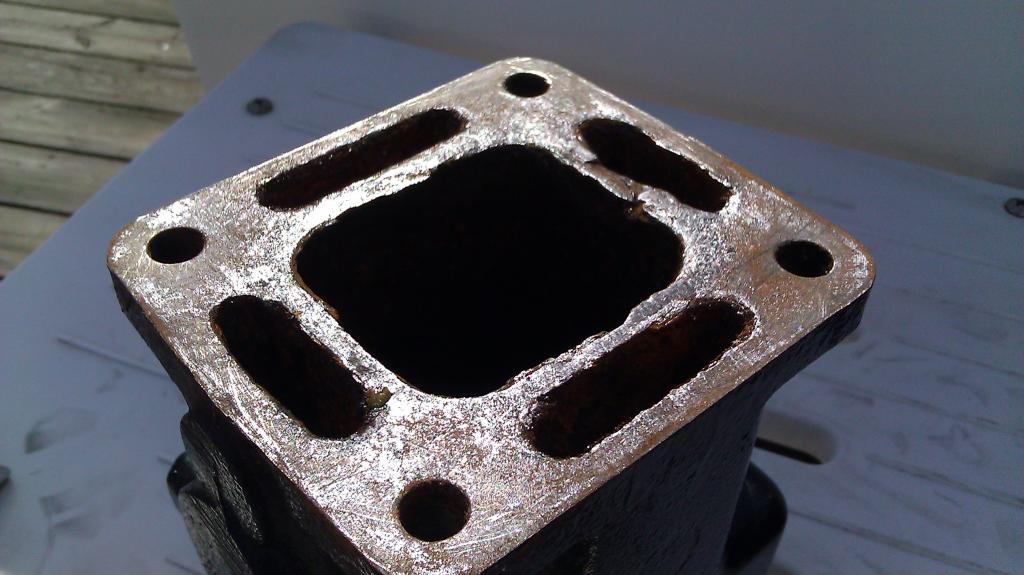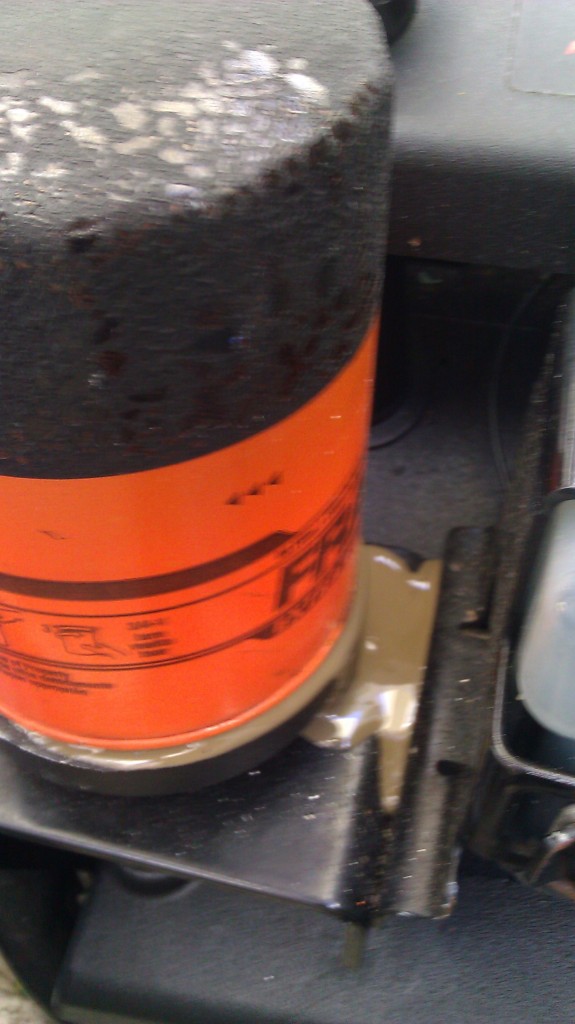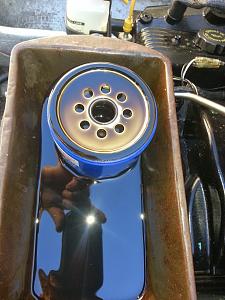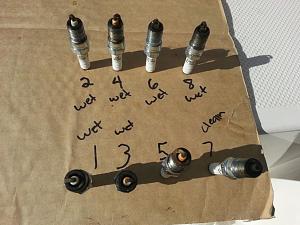 |
|
 10-22-2013, 07:48 PM
10-22-2013, 07:48 PM
|
#1
|
|
Lieutenant
Join Date: Jul 2013
Location: Minneapolis
Posts: 56
|
 A gallon of water in the engine oil
A gallon of water in the engine oil
Last time I used my boat -year 2000 2300SC 5.7 Liter - it ran flawlessly, this was several weeks ago. I went to winterize it last weekend and it wouldn't even turn over - I actually got it to turn about a quarter turn. The batteries checked out ok so as I checked things, I found the oil was way overfull.
I had changed the oil this season and checked when I was done and have checked often. I decided to pump out the oil and what came out first was a full gallon of water. There was no water in the old oil when I had changed it previously so I am thinking something like a head or intake gasket went suddenly.
I am in Minnesota and it is getting cold fast so I need to figure out my next step very quickly. I do not have a indoor place to work on the engine so I am considering waiting until spring.
What I THINK I need to do next is:
1) pull the spark plugs and try to turn over (pumping any water from the cylinders),
2) fill the oil up (it is empty right now)
3) pull off the coil wire and turn the engine over to circulate the oil (I don't want to have the water hooked up to avoid any more water from entering, and also do not want the motor to start with any water potentially anywhere inside or burn up the impeller)
I dont think I want the engine to start without any water hooked up as it would burn up the impeller. Maybe I should pull out the impeller and run the engine for a couple of minutes.
Any suggestions would be appreciated.
__________________
|

|

|
 10-22-2013, 10:17 PM
10-22-2013, 10:17 PM
|
#2
|
|
Captain
Join Date: Oct 2011
Location: Chesapeake, VA
Posts: 556
|
When is the last time you changed the manifolds? That is most likely culprit. I recommend checking the manifolds before starting or turning the engine. Removing the plugs and checking for water in the cylinder heads would be good because it would give you starting point for manifold check; if one side of cylinders is dry, and other wet, then you know which manifold needs to be replaced.
You may have actually gotten lucky if you didn't notice any problems last time you operated the boat (crack/leak occurred when boat sat idle). Get the water out, replace the manifolds, and you may be good to go.
Could be head gasket, but doubtful given your description of symptoms.
Others with experience in this will chime in.
__________________
|

|

|
 10-22-2013, 11:17 PM
10-22-2013, 11:17 PM
|
#3
|
|
Admiral
Join Date: Feb 2012
Location: Essex, Maryland
Posts: 10,663
|
spydermann22 inaddition to what you have stated remove each sparkplug and spray fogging oil into each cylinder. Drain water from engine, pull t-stat housing and fill block with antifreeze. Pull hose and fill manifolds with anti-freeze.
This will protect the engine from cracking and the piston rings from seizing.
I have heard of a few folks having the intake gasket leak this year with the same results. A compression test will tell you if its the head gaskets. and as jrsick said manifold are also an option however since you had a rapid change in a short time I would go with the intake or head gasket.
__________________
1997 Silverton 362, 7.4 Crusaders
1997 2400 SCR, 5.7 Vortec / Bravo 2
Mike
|

|

|
 10-23-2013, 10:09 PM
10-23-2013, 10:09 PM
|
#4
|
|
Lieutenant
Join Date: Jul 2013
Location: Minneapolis
Posts: 56
|
Thanks guys for your help in this matter.
jrsick, I have not ever changed the manifolds. I puchased the boat this summer.
What or how much of the manifolds would need to be replaced? Upper, elbow, riser etc..
mmwjr & jrsick is there any way to test for Intake Gasket failure or Exhaust Manifold failure without removing them?
|

|

|
 10-23-2013, 11:24 PM
10-23-2013, 11:24 PM
|
#5
|
|
Admiral
Join Date: Feb 2012
Location: Essex, Maryland
Posts: 10,663
|
spydermann22 since it is an open system there is no way to perform a pressure test on the cooling.
Since you have a large amount of water in the oil pan in a short time I doubt the manifolds are the issue as they would allow water into the cylinder which would then have to leak past the piston rings. Ussually only small amount of water will leak past the rings.
Was there any water in any of the cylinders? If so it's probably a head gasket, if not I would go with the intake gasket. Once removed it should be clear that the intake was leaking at the water to head passages if that is the case.
__________________
1997 Silverton 362, 7.4 Crusaders
1997 2400 SCR, 5.7 Vortec / Bravo 2
Mike
|

|

|
 10-24-2013, 12:11 AM
10-24-2013, 12:11 AM
|
#6
|
|
Captain
Join Date: Nov 2010
Location: Massapequa, New York, United States
Posts: 762
|
The good news is you found it before it froze.
So, Change the oil, pull the plugs and check each one for water droplet before you dry them off and put it back in.
Keep noted to which side of the engine the wet plugs are.
disconnect the serpen belt and let it hang lose, then run the engine for a min or two, this will not hurt it.
this will move the new oil, and the heat will dry out the humidity, you don't want water in the rings over the winter.
you can do this several times, after the engine cools.
Run the engine until the manifold get hot to the touch.
I bet you find one side of the the engine plugs are wet from a leaking manifold.


|

|

|
 10-24-2013, 02:30 PM
10-24-2013, 02:30 PM
|
#7
|
|
Admiral
Join Date: Jul 2009
Location: Fairfax Va
Posts: 1,512
|

I would caution you to NOT run the engine for a minute or two without water in it.
The vast majority of the heat from combustion is transferred to the cylinder walls and cylinder head valve chamber. Some of the heat is absorbed by the piston (which expands as it heats up), and the rings transfer the heat they generate (from friction) to the cylinder walls.
If there is no water on the other side of the cylinder wall, and in the water passages of the cylinder head on top of the combustion chamber and around the valve seats, to absorb and dissipate the generated heat the cylinder, the cylinder head, the exhaust valve (and the intake valve to a lessor extent), the piston top, and the rings are going to get very hot. Very fast.
I agree that you need to do what you can to get the water/moisture out but I wouldn't run it without water for any more than 10 or 15 seconds at a time, with 30 to 60 minutes of cool down in between. Frankly, I doubt I'd run it without water at all, choosing instead to crank it with the starter with the plugs removed (need to allow the starter to cool down every now and then also), and squirting oil into the cylinders (try to squirt it to the back of the cyl).
Plan on changing the oil a couple of times during the cleaning process.
All my opinion, of course.
|

|

|
 10-24-2013, 03:25 PM
10-24-2013, 03:25 PM
|
#8
|
|
Captain
Join Date: Nov 2010
Location: Massapequa, New York, United States
Posts: 762
|
well, you could always run the engine with the garden hose on, and with the manifold water line disconnected, so the water pump and block are cooled and not the manifolds.
if you do this, and your oil stays clear of water, then you know its not your heads, or internal gaskets, but in fact the manifolds.
Youtube is full of videos of engine with no oil running for 10 min before they start smoking.... its a sight to see.
|

|

|
 10-24-2013, 04:59 PM
10-24-2013, 04:59 PM
|
#9
|
|
Admiral
Join Date: Feb 2012
Location: Essex, Maryland
Posts: 10,663
|
I agree with ss about not running without water. Late model engines (60 - 70's and newer) have thinner castings and are more prone to damage. Less metal less thermal mass to absorb heat.
While you can run an engine for 10 minutes without oil or coolant before it destructs you are doing damage all along taking life out of the engine.
__________________
1997 Silverton 362, 7.4 Crusaders
1997 2400 SCR, 5.7 Vortec / Bravo 2
Mike
|

|

|
 10-24-2013, 05:07 PM
10-24-2013, 05:07 PM
|
#10
|
|
Admiral
Join Date: Feb 2012
Location: Essex, Maryland
Posts: 10,663
|
pas I just don't see how leaking manifolds would result in a large volume of water in the crankcase. Yes water would get into the cylinder and some may leak past the ring, if the compression is good a cylinder builds and holds up 150 psi so how could a large amount of water be able to leak past the rings?
A blown head gasket would allow flow between the coolant passages, cylinders, and oil return. Even this is local and not the entire side of an engine.
Intake gasket would allow water to leak into the valley under the intake which then drips into the oil pan. It may also allow water to get into the adjacent intake runner but this will only happen on the ends of the head where the water passages are.
__________________
1997 Silverton 362, 7.4 Crusaders
1997 2400 SCR, 5.7 Vortec / Bravo 2
Mike
|

|

|
 10-24-2013, 05:23 PM
10-24-2013, 05:23 PM
|
#11
|
|
Captain
Join Date: Oct 2011
Location: Chesapeake, VA
Posts: 556
|
Quote:
Originally Posted by spydermann22

Thanks guys for your help in this matter.
jrsick, I have not ever changed the manifolds. I puchased the boat this summer.
What or how much of the manifolds would need to be replaced? Upper, elbow, riser etc..
mmwjr & jrsick is there any way to test for Intake Gasket failure or Exhaust Manifold failure without removing them?
|
spydie, lots of good comments. I think your problem is the manifold based on your post saying that the engine ran fine last time you used it. With a failed head gasket, you should have noticed reduced power and rough running and idling. I doubt it is an intake gasket; this also causes reduced power as air leaks into the vacuum.
If it is the manifold, you will probably just need the manifold and not the other components you mention.
The quickest way to confirm or eliminate head gasket is a compression check. If not the head gasket, then next step is to remove the manifold.
|

|

|
 10-24-2013, 07:45 PM
10-24-2013, 07:45 PM
|
#12
|
|
Admiral
Join Date: Jul 2009
Location: Fairfax Va
Posts: 1,512
|

Quote:
Originally Posted by spydermann22

Last time I used my boat -year 2000 2300SC 5.7 Liter - it ran flawlessly, this was several weeks ago. I went to winterize it last weekend and it wouldn't even turn over - I actually got it to turn about a quarter turn.
|
This symptom certainly suggests to me that there could be water in a cylinder. Water doesn't compress so when that piston/cylinder combo came up on it's compression stroke it hydrolocked. Removing the plugs will tell you for sure, water will come out.
I agree, Mike, I don't see how a leaking manifold could dump a gallon of water past the rings after the engine was shut down. And if it were leaking into a cyl while the engine was last running I think there would have been some signs; like steam from the exhaust or the engine developed a miss or two.
Step one:remove spark plugs and inspect. If any of the tips are white it means that those cylinders are burning water (the water is "steam cleaning" the tips of the spark plugs. If none are white, water was not getting into the cylinder(s) while the engine was running.
Step two: With the plugs removed attempt to turn the crankshaft by hand several revolutions.
|

|

|
 10-24-2013, 08:50 PM
10-24-2013, 08:50 PM
|
#13
|
|
Lieutenant
Join Date: Jul 2013
Location: Minneapolis
Posts: 56
|
You guys are the BEST! Many thanks for all of your help!!
|

|

|
 10-28-2013, 03:54 PM
10-28-2013, 03:54 PM
|
#14
|
|
Lieutenant
Join Date: Jul 2013
Location: Minneapolis
Posts: 56
|

I wished I had more daylight and a better pressure tester. I borrowed it from the local Oreileys. It did work but...
I pulled the plugs, all of them were obviously wet except for #s 5 & 7, they didn't seem as wet as the others. I hooked up a (later found to be very weak) battery and cranked. All of the plug holes spit out water, rusty colored water. The back cylinders seemed to spit out more water than the front. After turning it over a few times I spayed fogging oil into each hole and turned over a few more times, then repeated. I let it sit for about an hour while pulling the oil filter which had no signs of water whatsoever - see pic.
I then took pressure tests, 1,3,5 & 7 only read 100 lbs ea. but the battery barely made it past the last cylinder (I did #7 1st and worked farward). I put in a fresh battery and went to the other side which had readings between 175 - 200 lbs. I went to re-check the 1-7 side again and the gauge quit reading so I do not know how accurate any of the readings were. By sound, all of the cylinders sounded to have the same amount of resistance on the starter motor.  
|

|

|
 10-28-2013, 05:44 PM
10-28-2013, 05:44 PM
|
#15
|
|
Admiral
Join Date: Feb 2012
Location: Essex, Maryland
Posts: 10,663
|
So no signs of water at the oil filter but you stated 1 gallon in the pan, not sure what to make of this other than the water did not enter the system when the engine was last ran and drain into it after shut down.
When you did the compression test were all the sprk plugs out? If so the engine should turn easily as no compression exist except cylinder with the tester on it. I would go buy a new compression tester (~$50) and recheck the odd bank with the fresh battery. If the reading are unchanged I would suspect the exhaust vavles are burnt.
How many hours are on this engine? Origional exhaust? Right now I am thinking both sides of exhaust are bad to get water on both side yet have good compression (at least on one side). But this doesn't account for a gallon of water in the pan. Are you sure it was water and not overfilled with oil?
__________________
1997 Silverton 362, 7.4 Crusaders
1997 2400 SCR, 5.7 Vortec / Bravo 2
Mike
|

|

|
 10-28-2013, 06:24 PM
10-28-2013, 06:24 PM
|
#16
|
|
Captain
Join Date: Oct 2011
Location: Chesapeake, VA
Posts: 556
|
I recommend that you get a battery charger. You will use it often. It's good to know that battery is 100% before a weekend on the lake. I've got a single battery so it's a big deal to me.
good luck with the compression check.
|

|

|
 10-28-2013, 08:09 PM
10-28-2013, 08:09 PM
|
#17
|
|
Lieutenant
Join Date: Jul 2013
Location: Minneapolis
Posts: 56
|

mmwjr: it is water, I pumped it into a windshield washer container. the container is full with about 1/2" of oil on top & the transition from water to oil is about a 1/4" of foam but the water is clear.
I bought the boat this summer, it ran very well. No hour meter. Seller said the boat sat for 7-8 years. I had the carb pulled & rebuilt & gave it a complete tune up. One thing that I remember that I thought was odd is the old cap looked very new. I posted here earlier this year regarding my issues with the carb (and my mis-diagnosing). It was blowing a ton of carbon. I doubt the manifolds had been changed.
I think I have it winterized well enough to let it sit and open it back up in the spring.
I had seen something in the past that brings me to a question. A few years back I was on a friend's boat which ended up having some type of issue that caused it to overheat. We sat for a while to let it cool off but once we got going again, he was hell bent on making it to the dock - and did. I went over to help him give it a lookover and pulled the outdrive off and found the rubber flappers that should have been inside the exhaust had melted and were wrapped around the shift linkage (at the out-drive connection). I am curious if a misfire or "carb cough" during shut down could suck water up to the point of what I have going on - if these flappers were missing. It seems far-fetched to me but the situation I have seems very out of the ordinary.
|

|

|
 10-28-2013, 10:44 PM
10-28-2013, 10:44 PM
|
#18
|
|
Captain
Join Date: Nov 2010
Location: Massapequa, New York, United States
Posts: 762
|
is that water into oil, or water into wine..... I'm confused....? 
|

|

|
 10-29-2013, 12:58 AM
10-29-2013, 12:58 AM
|
#19
|
|
Captain
Join Date: Oct 2011
Location: Chesapeake, VA
Posts: 556
|
spydie, you bring up some interesting questions about carb cough and melted flappers. I think the probable cause of your problem has been discussed in this thread, but since you're interested in far-fetched ideas I'm glad to throw a few out. You've got all winter to research so take a look at "hydrolock" and "reversion". I'm definitely no expert, but understand these to occur with high degree cams, and carb cough may provide similar conditions. Do you know if your engine has had mods to the cam or exhaust? Just putting it out there.
|

|

|
 10-29-2013, 03:31 AM
10-29-2013, 03:31 AM
|
#20
|
|
Admiral
Join Date: Feb 2012
Location: Essex, Maryland
Posts: 10,663
|
spyder yes if the flapper valves are missing water could flow back into the cylinders but once again I don't see how a large amount of water would get past the rings and into the oil pan. Maybe this could happen over a long time but I would think more than 1 season and you said that you had changed the oil earlier this year. H the engine ever overheated for you? I had a friend who overheated his engine and after replacing the water pump and exhaust ran fine the rest of the year only to have similar story as you the next. It resulted in a rebuilt long block.
BTY what cap are you refering too? oil, heat exchanger (closed cooling)?
Once again I would recheck the compression with a new guage and fresh battery.
__________________
__________________
1997 Silverton 362, 7.4 Crusaders
1997 2400 SCR, 5.7 Vortec / Bravo 2
Mike
|

|

|
 |
|
 Posting Rules
Posting Rules
|
You may not post new threads
You may not post replies
You may not post attachments
You may not edit your posts
HTML code is Off
|
|
|
|
 » Recent Threads
» Recent Threads |
|
|
|
|
|
|
|
|
|
|
|
|
|
|
|
|
|
|
|
|
|